- Research Talks presents The Next Generation of Additive Manufacturing
- Engineering announces the Pearl Sullivan Emerging Global Leaders Award
- President Hamdullahpur hosts undergraduate and graduate student roundtables
- Open approach to online course creation saves students $56K each term
- Big Fish: A tale of connection, love, and family
- Wednesday's notes
Editor:
Brandon Sweet
University Communications
bulletin@uwaterloo.ca
Research Talks presents The Next Generation of Additive Manufacturing
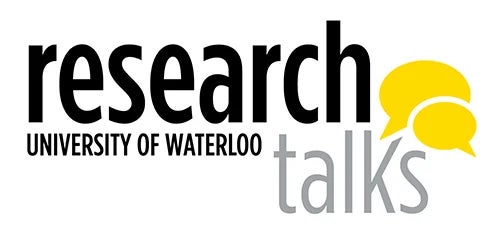
A message from the Office of Research.
Learn about the future of additive manufacturing during the next Research Talks event, Enabling Disruptions: The Next Generation of Additive Manufacturing on Tuesday, March 16 from 11:45 a.m. to 1:15 p.m.
Please register to receive a link to take part in this online panel presentation and Q&A featuring:
Ali Bonakdar (Additive manufacturing research at Siemens Energy): Ali Bonakdar is an advanced manufacturing technology lead at Siemens Energy Canada Limited and an adjunct professor at Concordia University, University of Waterloo, and École de technologie supérieure (ÉTS). With more than 20 years of industrial and academic experience in his field, Ali will discuss additive manufacturing research at Siemens Energy.
Mélissa Després (The outcomes and benefits of large-scale collaboration for Canada): Mélissa Després is a manager of technological innovation at the National Research Council of Canada who is experienced in the establishment of strategic industrial collaborations and research and development in metallurgical materials and processes. She will outline the outcomes and benefits of large-scale collaboration for Canada in additive manufacturing.
Ehsan Toyserkani (Opportunities, challenges, and trends in multi-scale additive manufacturing): Ehsan Toyserkani is Canada Research Chair in Additive Manufacturing (AM) and is a professor at the University of Waterloo where he established the Multi-Scale Additive Manufacturing (MSAM) Laboratory, the first AM laboratory at a Canadian university. With more than 20 years of experience in different aspects of AM research and development, he will discuss the opportunities, challenges, and trends in multi-scale additive manufacturing.
Mihaela Vlasea (Bridging technological gaps with research on innovative design, process optimization, and new materials): Mihaela Vlasea is an assistant professor in mechanical and mechatronics engineering at the University of Waterloo and the research co-director of the Multi-Scale Additive Manufacturing Laboratory. Her research focuses on innovative design, process optimization and adoption of new materials for powder bed fusion and powder bed binder jetting additive manufacturing processes. She will discuss bridging technological gaps with research on innovative design, process optimization and new materials.
Engineering announces the Pearl Sullivan Emerging Global Leaders Award
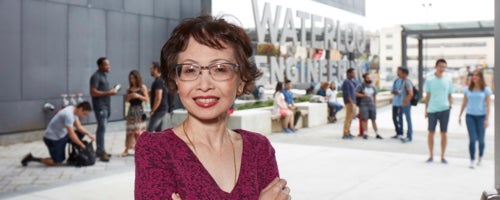
A message from the Faculty of Engineering.
With the inspiring support of alumnus Sanjay Malaviya (BASc '93, computer engineering), the Faculty of Engineering has established the Pearl Sullivan Emerging Global Leaders Award.
The award will celebrate a student with determination and passion who has worked to make the Waterloo Engineering community a better place, and will take that same energy to a career focused on improving the human condition.
One award of $50,000 will be presented annually to an outstanding undergraduate leader graduating from any engineering program.
The recipient will be a student with a proven record of leadership through participation in extracurricular and volunteer activities at the University of Waterloo. They will have demonstrated the potential to grow as a leader, will have inspired others to action, and have made a difference in their community.
The award is intended to be a financial catalyst to kick-start a lifelong commitment to excellence, leadership and change for the common good.
For more information on the award, visit the Emerging Global Leaders website.
The deadline to apply is March 31, 2021.
President Hamdullahpur hosts undergraduate and graduate student roundtables
President Feridun Hamdullahpur recently hosted small virtual student roundtable discussions on Thursday, March 4 for graduate students and Monday, March 8 for undergraduate students.
The roundtable meetings were an opportunity for students and the president to have an informal dialogue about their concerns and experiences at the University, especially during this time of remote learning, co-op jobs and research. Questions posed by students during the 90-minute meetings ranged from ongoing remote learning experiences to international student collaborations, housing, mental health and anti-racism and equity concerns.
The president has hosted several roundtable discussions with students over the past year to break down barriers and hear first-hand how students are doing and where the University could make improvements to enhance their overall experience. President Hamdullahpur was also joined by Jeff Casello, associate vice-president of graduate studies and postdoctoral affairs, Chris Read, associate provost, students, David DeVidi, associate vice-president, academic and Jean Becker, interim associate vice-president, human rights, equity and inclusion and senior director, Indigenous initiatives to hear from students and help address some of the questions and concerns raised.
The president will continue to look to engage with students through future roundtable discussions to stay connected to their needs and challenges in the months to come.
Open approach to online course creation saves students $56K each term
By Ceili Minten.
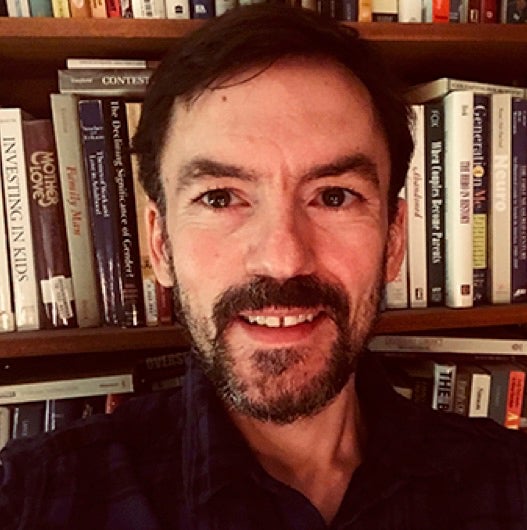
PSYCH 253 saves students $56,385 each term. Previously, the 300 students who enrolled each term were required to buy a textbook listed at $187.95. Redesigning the course around open textbooks eliminates this cost.
Books are very expensive; not all students can afford to buy, or choose to buy, all textbooks. Not getting a textbook reduces learning and lowers grades. As well as eliminating cost, using open textbooks also eliminates a barrier to success.
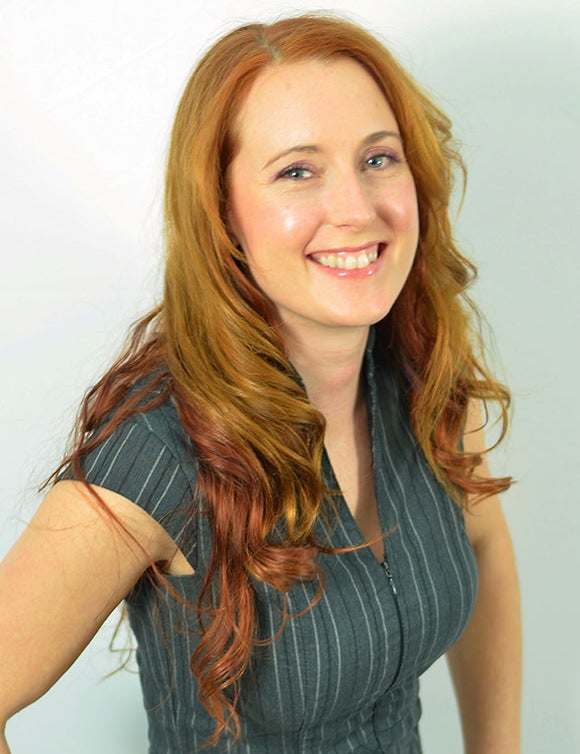
However, course author Richard Eibach and online learning consultant Kristin Wilson have gone beyond using an open text. They have created a mostly text-based course that weaves together open resources with Eibach’s own content.
These resources include:
- Principles of Social Psychology–1st International Edition, by Rajiv Jhangiani and Hammond Tarry, which was adapted from Principles of Social Psychology by Charles Stangor; and
- Introduction to Psychology: The Full Noba Collection, edited by Robert Biswas-Diener and Edward Diener.
In addition to the adapted and original text, the course uses various videos that bring to life the content in other ways. There are no narrated slides or recorded lectures, said Eibach. These formats are very hard to change, especially in term. Text, on the other hand, is easy to change. Even in term the course can be changed and improved.
Create your own content
Continual but gradual change is very important to Eibach. He would like most of the content in the course to be his own eventually. Starting with open resources allows him to create his own content, module by module.
Wilson recommends course authors who would like to create their own content but who do not have time to create an entire course of original content at once to start with open content and make continual changes. Every iteration will be better, she said. The author may be able to change examples to fit the needs of their class based on what students mention, discuss, and discover, allowing students to feed into the adapting content. This creates a well-balanced course where both students and the course author benefit greatly.
Creative Commons
Of course mixing and adapting material from several sources means careful acknowledgement of those sources. Resources available under a Creative Commons license that is Share Alike require a description of changes made to the original. Any derivative work needs to be named and licensed. This all requires a lot of space that could easily distract the student from the material. The solution that Eibach and Wilson arrived at was to provide a short citation or credit statement adjacent to each section linked to a more detailed explanation on the Syllabus/Credits and Copyright page.
For more on the Creative Commons license under which the open texts used in this course were made available, see https://creativecommons.org/licenses/by-nc-sa/4.0/.
For more information about open education or to become involved in raising awareness, see Open Scholarship at Waterloo.
Ceili Minten provides copyright support at The Centre for Extended Learning.
Big Fish: A tale of connection, love, and family
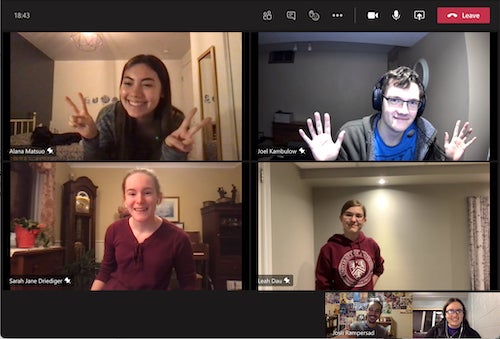
This is an excerpt of an article originally published on the Conrad Grebel University College website.
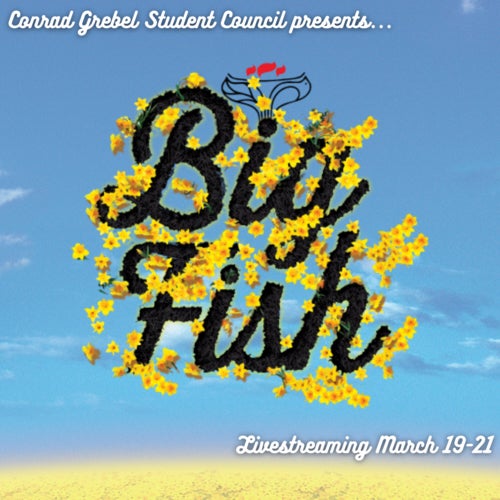
A fun and enjoyable experience. An awesome way to spend a weekend. Completely student-run, put together during a pandemic, with so much work put in by the cast and production teams. And best of all, a once-in-a-lifetime opportunity. This is the first time Big Fish the Musical will be presented as a movie, said Hannah Bernstein, Grebel student and member of the musical production team.
This past year has proven difficult for everyone. But despite the challenges, and thoughts that it wouldn’t happen, the Conrad Grebel University College student-run musical team hopes to bring joy and excitement to our lives in a time of great stress with the virtual 2021 musical, Big Fish. Director Josh Rampersad explained the musical will tell “a larger-than-life tale of a story-teller and his son learning about fatherhood, mortality and what it means to leave a legacy.”
“We follow Will, an expectant father, as he works to reconcile and understand his father in the short time they have left,” production team member Bronwyn Erb said. “Connection, love and family are universal themes that are unpacked, interspersed with amazing stories.” These themes are an important part of our society, and especially relevant now, where loneliness due to isolation and fear for the ones we love is such an issue. Family, love, and connection are driving forces of our lives, and this touching musical shows that there is always hope and there is always someone who cares.
Initially, as many other live events were cancelled around them, the musical team wasn’t confident that their show would survive. But they did not let these fears stop them. They sat down and discussed creative ways to produce their piece in a virtual setting, and before long, the pieces started falling into place. “The core team’s determination really shone through as everyone was willing to make it work,” Bronwyn said.
The entire musical team has employed a variety of inventive ways to adapt the musical to work in an online setting.
“Due to the pandemic, everything is being coordinated and done remotely,” Josh said. “Rehearsals have now become recording sessions, and we have a whole new team that edits all the recordings together.” In order to convey realistic sightlines and actions, cast members have assigned inanimate objects to be the different characters they interact with and use mirrors so that they can see themselves.
Production team members and editors have applied many of their technology-related skills to piece everything together.
“Since we want to capture actor reactions throughout an entire scene, we have had to record synchronously so the actors can hear each other and react with correct timing,” Hannah explained. “We used different editing techniques to help create the illusion that the actors can see and interact with each other,” Bronwyn said.
While the move online and increased amount of work have proven difficult, it has also given the editors an opportunity to add creative effects into the musical that they would have otherwise been unable to do in a live setting.
“Working with the director Josh, we added in some fantastical elements with digital effects to help set the stage for this musical,” Bronwyn said.
Read the rest of the article on the Conrad Grebel website.
Wednesday's notes
Renison University College is hosting a lecture on Healing Tattoos on March 16, from 7 p.m. to 8:30 p.m. Registration is available on EventBrite.
Healing tattoos are tattoos that people plan or get in order to disrupt, (re)claim, celebrate and/or challenge an aspect of themself and/or something social. Tattoos that honour someone who has died is one example. We will talk about the Healing Tattoos project and share some stories and tattoos that have helped people grow and heal.
Panelists:
Charles Gillen (he/him) is a third-year student majoring in peace and conflicts at the University of Waterloo. Charles’s main focus is connecting the research to race and our society today. Through mostly past experiences, he has been able to relate his research to my own life for overall better understanding.
Amanda Lougheed, BSW, RSW (she/her) is an MSW student of Renison University College at the University of Waterloo doing her practicum with Dr. Susan Cadell as a research student. She works in mental health and addictions services in Victoria, BC.
Susan Cadell, PhD, RSW (she/her) is a social work researcher and Professor in the School of Social Work at Renison University College at the University of Waterloo. Susan's research concerns death, dying and bereavement, particularly positive outcomes of caregiving and grief.
Here is the latest Nutrition Month Myth vs. Fact supplied by Health Services Dietitian Sandra Ace:
Myth: Coffee is bad for you.
Fact: Moderate coffee consumption can be part of a healthy diet for most adults.
Coffee is the most commonly consumed beverage in the country, according to the Coffee Association of Canada, leading even tap water. And while many habits changed during the pandemic, in October 2020, coffee consumption remained steady in Canadian consumers ages 18 to 79, with 71 per cent reportedly drinking at least one coffee the previous day.
While it’s often thought of as a guilty pleasure, research shows that coffee might provide more than just a caffeine jolt. Naturally occurring plant chemicals in coffee beans may be protective against some diseases. Coffee has been linked to many potential health benefits, including a lower incidence of certain cancers and a lowered risk of Parkinson’s disease, Type 2 diabetes, depression and cardiovascular disease.
Coffee also contains caffeine, a stimulant that can help to temporarily boost energy. Too much caffeine can result in negative side effects including anxiety, irritability, heart palpitations and insomnia, plus it may aggravate gastrointestinal problems such as heartburn and irritable bowel syndrome. Consuming up to 400 mg of caffeine per day (300 mg for pregnant or breastfeeding women) is not associated with adverse health effects in most adults. This amount is the equivalent of 3 or 4 cups (8 oz/250 mL) per day. Keep in mind that portions in coffee shops are much larger than a standard cup. A large coffee (563mL) at Tim Hortons has about 270 mg of caffeine while a Starbucks grande (473mL) may have up to 380 mg of caffeine, depending on the type of coffee.
The potential health benefits of coffee may be negated if you add lots of sugar and cream. A large double-double coffee has about 270 calories, so consider substituting milk for the cream, changing to a regular, choosing a smaller size, or opting for a walk outside instead of going to the closest coffee shop. Flavoured specialty coffee drinks such as cappuccinos and macchiatos may contain 300 to 500 calories, so save these for occasional treats. If you enjoy these beverages, you can check the company websites for nutrition information.
Link of the day
When and Where to get support
Students can visit the Student Success Office online for supports including academic development, international student resources, leadership development, exchange and study abroad, and opportunities to get involved.
Instructors can visit the Keep Learning website to get support on adapting their teaching and learning plans for an online environment.
Updated Course templates are now available within your course in LEARN to help you build and edit your content and assignment pages quickly. Support for Winter 2021 is available.
The following workshops, webinars, and events are offered by the KL team (CTE, CEL, ITMS, LIB):
Independent Remote Course Design Essentials. Self-directed, continuous self-enrollment course in LEARN.
PebblePad Users Group (CTE7526), Wednesday, March 24, 2:00 p.m. to 3:30 p.m.
Employees can access resources to help them work remotely, including managing University records and privacy of personal information. Here are some tips for staying healthy while working from home.
Stay informed about COVID cases on campus by consulting the COVID case tracker.
Whether you’re a student or faculty member, the Writing and Communication Centrehas virtual services and programs to help you with all of your academic writing needs. This term we have added evening and weekend one-to-one appointments with our peer tutors, and our NEW one-to-one workshops, where you can learn the content directly from one of our writing advisors.
- Undergraduates: Work with us to brainstorm, draft, revise, and polish your assignments in one-to-one appointments. Ask questions and learn writing tips at our Instagram Live Q&A sessions, and beat isolation while improving your writing skills at the weekly PJ-friendly writing groups.
- Graduates: Meet with our advisors in one-to-one appointments. Join the online writing community at the Virtual Writing Cafés, learn how to present your work at Speak Like a Scholar, or get moving on your dissertation at Dissertation Boot Camp.
- Faculty and Instructors: Request custom workshops for your courses, join the Waterloo writing community at the Virtual Writing Cafés, or make progress on your article, book, or chapter in one-to-one meetings with our faculty specialist.
Co-op students can get help finding a job and find supports to successfully work remotely, develop new skills, access wellness and career information, and contact a co-op or career advisor.
The Centre for Career Action assists undergraduates, graduate students, postdocs, staff, faculty, and alumni through navigating career services that are right for them. You can attend a one-on-one appointment or same day drop-in session at the CCA for assistance with cover letter writing, career planning and much more. You can also book an appointment online or visit our Live Chat to connect with our Client Support Team. The CCA is here to help you.
If you feel overwhelmed or anxious and need to talk to somebody, please contact the University’s Campus Wellness services, either Health Services or Counselling Services. You can also contact the University's Centre for Mental Health Research and Treatment. Good2Talk is a post-secondary student helpline available to all students.
The Library has published a resource guide on how to avoid information overload.
The Faculty Association of the University of Waterloo (FAUW) continues to advocate for its members. Check out the FAUW blog for more information.
The University of Waterloo Staff Association (UWSA) continues to advocate for its members. Check out the UWSA blog for more information.
The Indigenous Initiatives Office is a central hub that provides guidance, support, and resources to all Indigenous and non-Indigenous campus community members and oversees the university Indigenization strategy.
The Waterloo Indigenous Student Centre, based at St. Paul’s University College, provides support and resources for Indigenous students, and educational outreach programs for the broader community, including lectures, and events.
WUSA supports for students:
Peer support (Visit https://wusa.ca/peersupport to book an appointment):
- MATES – Available Monday to Friday, 10:30 a.m. to 9:30 p.m.; Saturday and Sunday, 10:30 a.m. to 5:30 p.m. (online only)
- Support sessions available in the following languages: Cantonese, English, Hindi, Mandarin, Portuguese, Punjabi, Spanish, and Urdu.
- Glow Centre – Available Monday to Friday, 4:00 p.m. to 8:00 p.m. (online only)
- RAISE – Available Monday to Friday – Varied hours (online only)
- Women’s Centre – Available Monday to Friday, 2:00 p.m. to 5:00 p.m. (online only)
Bike Centre – Will be reopening soon.
Campus Response Team, ICSN, Off Campus Community and Co-op Connection all available online. Check https://wusa.ca for more details.
Food Support Service food hampers are currently available from the Turnkey Desk on weekdays from 7:30 a.m. to 7:00 p.m. in the Student Life Centre. If you have any questions please email us at foodsupport@wusa.ca.
Centre for Academic Policy Support - CAPS is here to assist Waterloo undergraduates throughout their experience in navigating academic policy in the instances of filing petitions, grievances and appeals. Please contact them at caps@wusa.ca. More information is available.
WUSA Commissioners who can help in a variety of areas that students may be experiencing during this time:
- Equity – equity@wusa.ca
- Co-op and Experiential Affairs – coop.affairs@wusa.ca
WUSA Student Legal Protection Program- Seeking legal counsel can be intimidating, especially if it’s your first time facing a legal issue. The legal assistance helpline provides quick access to legal advice in any area of law, including criminal. Just call 1-833-202-4571.
Empower Me is a confidential mental health and wellness service that connects students with qualified counsellors 24/7. They can be reached at 1-833-628-5589.
When and Where (but mostly when)
Healthy Warriors at Home. Free programming including Online Fitness, Health Webinars, Personalized Nutrition and more from Warriors Athletics and Rec. Open to students, staff, faculty and alumni. Register today.
Livestream Exercises for Waterloo staff: Join us for an energy boosting Bootcamp or a fast and effective Express Home Workout! Open to UW Staff and subsidized by the Staff Excellence Fund.
Renison English Language Institute continues to offer virtual events and workshops to help students practice their English language skills.
Warriors vs. Laurier Blood Donation Battle. Join your fellow Warriors, donate blood and help us win the Blood Battle against Laurier for a second year in a row. Set up a profile or add the PFL code: UNIV960995 to your account if you have a blood.ca account already. Questions? Contact WarriorsInfo@uwaterloo.ca.
Warrior Rec Free Programs for Students, January to February.Wide range of free opportunities available to keep students active and healthy including: Fitness Classes (On-Demand), Health and Mindfulness Webinars, Personalized Nutrition Guides, Personal Training Consultations, Small Group Training and Warrior Reset. Register today.
Drop-in to Warrior Virtual Study Halls on Wednesdays from 5:30 p.m. to 7:00 p.m. Come together in this virtual space to set goals and work independently or in groups each week.
Noon Hour Concert: To tell a love story, Wednesday, March 10, 12:30 p.m.
Concept $5K Semi-Finals - Night 1, Wednesday, March 10, 5:00 p.m., virtual event
Concept $5K Semi-Finals - Night 2, Thursday March 11, 5:00 p.m., virtual event
Master of Taxation Virtual Information Session, Friday, March 12, 2:00 p.m. to 3:00 p.m. To register, visit www.mtax.ca.
FAUW Indigenization Reading Circle, Friday, March 12, 11:00 a.m to 12:00 p.m.
Master of Taxation, Virtual Information Session, Saturday, March 13, 9:00 a.m. to 10:00 a.m. To register, visit www.mtax.ca.
NEW - League of Legends Virtual Esports Camp hosted by the Waterloo Warriors, Tuesday, March 16 to Thursday, March 18. In collaboration with the Waterloo Region Sport Hosting Office. Camp open to participants aged 12-19. Register today.
NEW - Towards Reconciliation: 10 Calls to Action for Natural Scientists, Monday, March 15, 1:00 p.m. to 2:30 p.m., virtual event through Microsoft Teams, register today.
NEW - Concept Working Session: Fundraising, Tuesday, March 16, 5:30 p.m., Virtual Event.
NEW - The Collapse of Self-Transcendence: COVID-19 and Meaning-Making in Everyday Life , Wednesday, March 17th at 4:00 p.m.
Positions available
On this week's list from the human resources department, viewable on the UWaterloo Talent Acquisition System (iCIMS):
- Job ID# 2021-6264 - Faculty Financial Analyst - Dean of Mathematic Office, USG 10
- Job ID# 2021-6260 - Safety Administrator - Safety Office, USG 7
- Job ID# 2021-6181 - Co-ordinator, Continuing Professional Development - Optometry and Vision Science, USG 8
- Job ID# 2021-6265 - Instructional Support Coordinator - Work-Integrated Learning (WIL) Programs, USG 8-10
- Job ID# 2021-6253 - Communications Manager, Library – Library, USG 10
- Job ID# 2021-6250 - Academic Services Coordinator - Mechanical and Mechatronics Engineering, USG 6
- Job ID# 2021-6251 - Customer Service Coordinator - Cheriton School of Computer Science, USG 5
- Job ID# 2021-6252 - Manager, After-Hours, Campus Housing , USG 8
- Job ID# 2021-6269 - Program and Resources Co-ordinator - Campus Housing,USG 6
- Job ID# 2021-6147 - Outreach Activities Administrator - CEMC, USG 5
Secondments/Internal temporary opportunities
- Job ID# 2021-6239 - Grad Program Administrator/Scholarship Coordinator- School of Environment, Resources and Sustainability, USG 6
- Job ID# 2021-6266 - Instructional Support Coordinator - Work-Integrated Learning(WIL) Programs, USG 8-10
- Job ID# 2021-6254 - Administrative Co-ordinator, Arts and Business - Arts Undergraduate Office, USG 6
- Job ID# 2021-6267 - Client Support Specialist (Web Development) – IST, USG 7-8
- Job ID# 2021-6259 - Computing Consultant (UI/UX developer) - IST, USG 9-10
- Job ID# 2021-6233 - Graduate Admissions Coordinator, Course Based Programs - Electrical and Computer Engineering, USG 6
*Internal Application Deadline: Thursday March 18th, 2021 at 11:59PM